Have you ever been disappointed in the quality of your frozen fruit or veggie purchases? Well I certainly have. I invited onto the podcast my favorite frozen fruit and veggie company to share with you about their astounding products and share more about their farming techniques. That includes, get this. Zapping weeds with a tractor!
On our podcast, Eat Shop Waste Not, I conducted an interview with Erin and Brecklin from Stahlbush Island Farms.
Jump to:
🎧 Listen
You can listen to this podcast episode below or listen on any of these podcast players - Spotify, Apple Podcasts, Amazon Music, Google Podcasts. If you would prefer to read the text, you will find a transcript below.
🎞️ Highlights
Here is what you will hear/read about in this episode:
- Where Stahlbush Island Farms is located and how they got started.
- What frozen vegetables they offer.
- What frozen fruits they offer.
- What sustainable practices do they put in place.
📜 Read
Here is the transcript from our interview with Erin and Brecklin from Stahlbush Island Farms.
Eric: Everybody, welcome to this episode of Eat. Shop. Waste Not. I am your host, Eric Samuelson. Today I have two wonderful and knowledgeable guests with me. Erin and Brooklyn from Stahlbush Island farms out of Oregon welcome to the podcast and tell us how Stahlbush got started

🚜 What is Stahlbush Island Farms?
Stahlbush: Yeah, thank you so much for having us, Eric. We're looking forward to talking with you and sharing more about Stalbush, but a little bit about how we got started. So Bill and Carla Chambers purchased the land here on Stahlbush Island in 1985. And at that point it was just the two of them, two employees and two crops.
So they were farming wheat and sugar beet for seed. And then shortly after that, they got into farming pumpkins and they quickly realized that they were not utilizing the whole body of the pumpkin, the meat of the pumpkin, that they're only harvesting it for the seed. And if you know Bill, our owner, one of his common phrases is follow your waste streams, and wastes are just underutilized resources.
So quickly, the body of the pumpkin, the meat of it, was able to be turned into a resource exactly like Bill referred to. Um, Bill and Carla were approached by a pie company out of the Midwest, and they said if you can turn this into puree, we'll buy it for our pies.
So that was their first customer, um, was a pumpkin pie company, and they were able to supply pumpkin puree to them, and that opened the door to all sorts of other fruits and vegetables like strawberry puree, cauliflower puree. Um, so they purchased the farm in 85 and built the first processing plant here in 1989.
Just a few years later. Now in Stahlbush Island, even though we're, um, on the interior of Oregon and we're not on the coast, we are actually on an Island because we're are surrounded by two rivers, the St. Mary's and the Willamette. So we are actually on an Island, even though we're not on the coast.
Eric: Yeah, you don't think about that as a, you think guys to be coastal, but that's really cool that you're located there and what a great story to start things. It seems like, you know, it always starts with like these businesses usually start with like some little like, "Hey, I have something, you need something," here.
And it just kind of goes from there. So it's always great to see that happen. Um, I was out in Portland, Oregon. Um, let's see, that would be 2019, and I was at a farmer's market there and I, and I found out that seed production was such a big thing in Oregon. There were a lot of beekeepers there, that part of their job was to pollinate the crops so that they could be produce for seeds.
So I didn't, I had no idea that was such a like huge thing, um, in Oregon. So it's cool to see you guys kind of started that way and morphed into something, kind of different. So for those who are not familiar what kind of products do you guys offer right now?

🥕 Vegetables
Stahlbush: Yeah, under our Stahlbush Island Farms line, those are frozen, um, individually quick frozen or IQF fruit and vegetables. So, on the vegetable side, we have all the common vegetables you'd use in everyday cooking. Um, corn, peas, sweet potatoes.
We have some specially colored varieties. So, we have cool cauliflower, which is all different colors of cauliflower and it's really pretty. We have tricolored carrots, which are three different colors of carrots. We've got colorful sweet potatoes and crazy corn. So those are all really fun and they all incorporate, purple, white, and then usually one other color like yellow or green or another color of a vegetable.

🍓 Fruit
Stahlbush: And then on the berry side, we have cranberries. We have raspberries.
We have Marionberries, which are a special berry that was bred at OSU (Oregon State University) right here in Corvallis, and it's a berry that is less tart than a blackberry. It's elongated, which is how you can tell it from a blackberry. And they're fantastic, but not a lot of them make it out of Oregon because one, they don't travel well, and two, they're so delicious that we just eat them all here.
So our frozen line is one way that people who are outside of Oregon can actually taste and cook with Marrionberries, which are just phenomenal. And you can use them in everything that you'd use blackberries in, and then we also have a canned line called farmer's market foods. And that's the pumpkin that Brecklin was talking about earlier, the pumpkin puree and the sweet potato puree.
🐕 Pet Line
Stahlbush: We also do a butternut squash puree and they're single ingredient in a BPA free can. Um, and they're just fantastic and you can use them in so many things. We have recipes on our website that food bloggers create for us.
And then because two of those ingredients are so beneficial to dogs and cats, we also have a pet line called Nummy Tum Tum, which is canned pumpkin and canned sweet potato.
And I should mention Farmer's Market and Nummy Tum Tum are all organic. So they're organic single ingredient purees.
Eric: My daughter has a service dog, a Labradoodle, and sometimes she'll have to feed her pumpkin. Um, she has some digestive issues. She had a sickness when she was a puppy. So she has some digestive problems every now and then. So she uses pumpkin or butternut squash to kind of help with that process to help her make her feel better. And usually it works pretty well for, you know, just like a week or so. And it really helps.
Stahlbush: I'm glad to hear that.
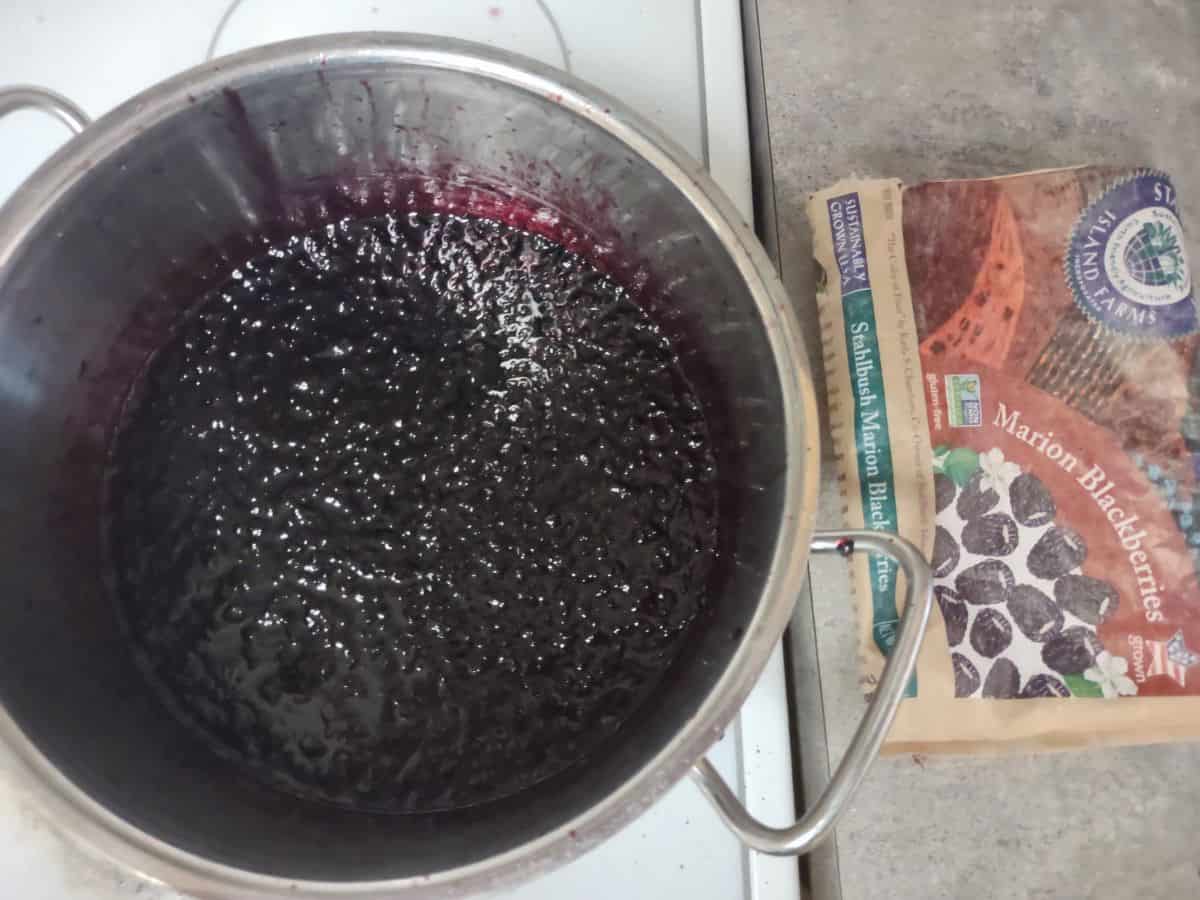
Eric: And I really like you point out the about the Marionberry difference in the blackberries.
I think some people just think like, Oh, they're just blackberries. They're just another fancy name for blackberries, but they are something that's, you know, more unique as, as you said here. And, you know, a lot of us, like I've never had a fresh Marionberry. I've had Marionberry jam and other things like that.
But I've never had a fresh Marionberry. So that's why I need to go to Oregon. I have not spent enough time there. And so definitely need to.
Stahlbush: And pick some on the farm.
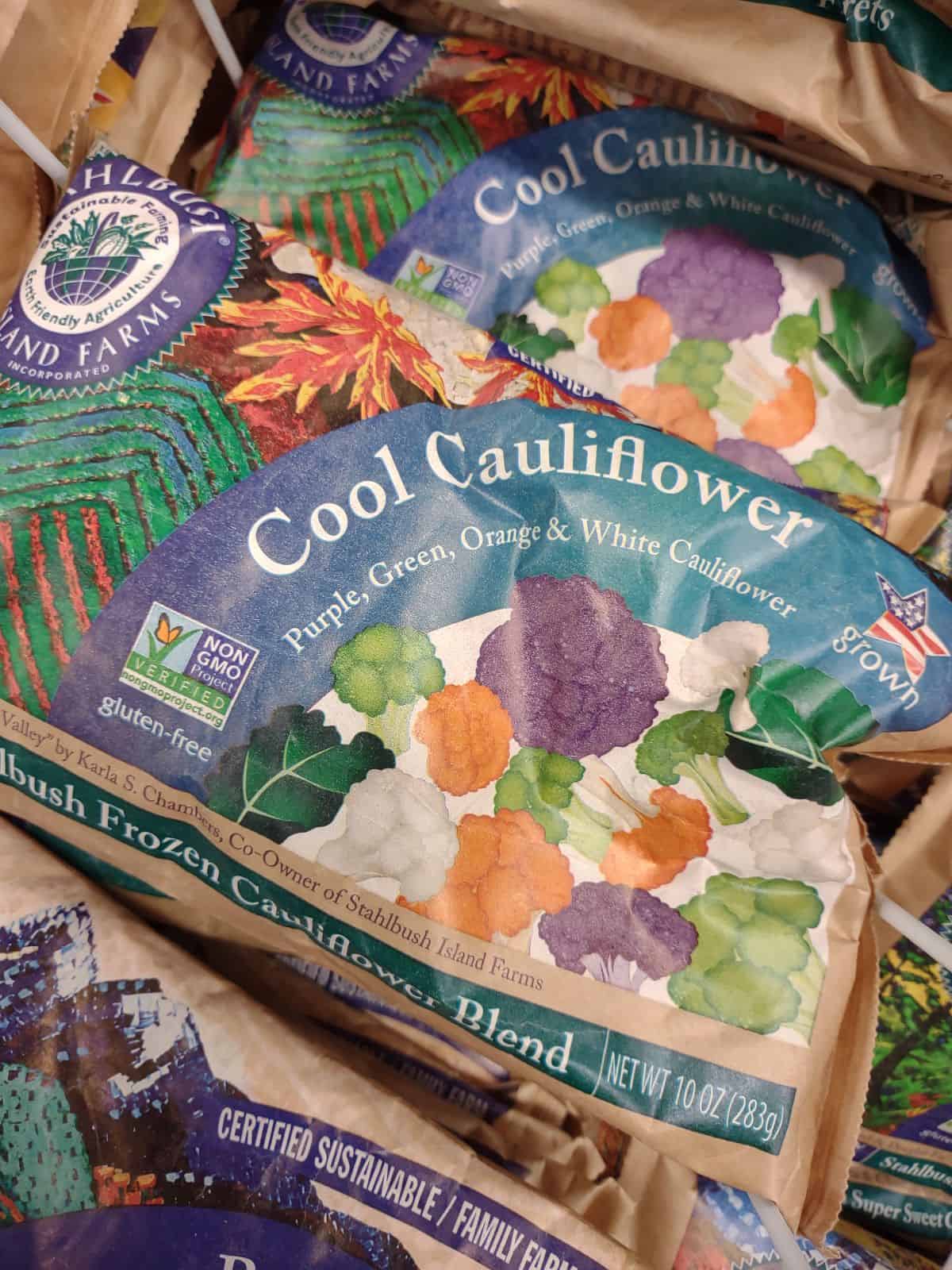
♻️ Sustainable Practices
Eric: I also want to ask you guys about sustainability, like what kind of things does your company, um, do to be sustainable?
Stahlbush: Yeah, so one thing that Bill and Carla are very proud of and that has been foundational to Stahlbush is our sustainability. So Stahlbush Island Farms was certified sustainable through the Food Alliance in 1997, and we were actually the 1st farm in the United States to have that certification, which we're really proud of.
And at that point in time, um, sustainability wasn't a big trendy word with consumers. It wasn't something that a lot of people knew about and really understood. Uh, but to Bill and Carla, sustainability just made sense when it came to farming because they wanted to keep the land in the best possible condition, for themselves and then to pass down to their future generations.
And so I think that now it's something that consumers care so much about and looking back, that's one of the best decisions they made that really aligned with their values. But Bill and Carla did a lot in educating consumers on what sustainability really meant. And when they saw that logo on our bag, it wasn't just a marketing claim, but it really meant something that we were taking action and prioritizing sustainability.
So sustainability is unique in that it's not just saying, you know, this is an organic growing practice, but it's looking at the whole farm. So we go through a whole farm audit every year that really looks at our soil nutrients and health, water conservation, air quality, wildlife habitat around the farm, the quality of life and training and safety of our employees.
So it's really looking at that whole farm and all the impacts around it. To go into a little bit more detail, um, uh, we were the first farm in Oregon to bring GPS guided tractors to our farms. which was huge at the time and now it's obviously a very common practice, but Bill and Carla we're very big on the innovation side of trying something new, seeing how we can save time, um, how we can become a little bit more efficient and help our teams out that way.
This GPS guided technology, um, just gave us so much more control and accuracy, uh, out on our farms. Um, our nutrient management programs as well. So rather than applying a standard set of nutrients to our crops each year, we're always testing our soils, um, every year to make sure that we're understanding the nutrient levels and what different farms might need.
No 2 crops are alike and no 2 farms are either. So we try to collect as much data as we can that way. We also split our fertilizer applications to feed the plant when it needs it. And in addition to that, we use compost rather than synthetic fertilizers whenever possible.
⛽ Bio-Gas Plant
And that brings me to another exciting piece of our sustainability, which is our bio-gas plant. So that's been instrumental for Stahlbush and for our customers because it's taking all the fruit and vegetable waste and turning it into energy to run our processing plant.
So, for example, corn, if you were to buy a bag of our retail corn in the freezer aisle. Under our Stahlbush brand, about 30% of the corn from what we'd harvest in the field goes into that bag, and the other 70% is waste. It's the cob and the husk and the leaves, so we're able to take all of that waste, the byproduct and turn it into energy through our biogas plant.
It also provides organic fertilizer to spread back onto our fields, hot water for sanitation. Um, steam to run our boilers, um, hot air to dry our pumpkin seeds, and then in peak capacities, we're also able to power a handful of local homes, which we're really proud of that.
We're producing enough energy to then sell it back to the grid. Um, and the biogas plant has just really been, um, instrumental in setting us apart in helping cultivate local food production, not only for our farm, but for other farms in the area as well.
And we were the first farm in North America to have a biogas plant. So that's really exciting. And the fertilizer that it produces is both organic and vegan, which is really rare because most organic fertilizers utilize fish meal or blood meal or bone meal. And so our products are able to have the vegan and organic claim.
So like, especially they can puree since they're all organic. So that's really exciting. Similar technology has been used a lot on dairies, but it's very rare to have the fruit and vegetable type of digester, which we're able to utilize so much more of that waste because it just has so much more energy, um, versus what you would typically see on a dairy.
Eric: I love that you guys are kind of like the innovators of getting on board with things without even like the pressure to get on board with things like before everyone else was doing it and that you're , utilizing all of it, as you look at corn especially as you harvest the air off it, but the amount of percent of the plant is so small.
You have all that the grasses, the leaves, you know, all that, all that extra stuff that you got that just could be discarded here. But you're finding a way to utilize that and turn it into something that is not only beneficial for you guys and you're helping other people too.
Hats off to you guys for doing that. I adore that so much. Yeah.
Stahlbush: Thank you. We're definitely not perfect, but I'd say everyone shows up trying to figure out what that next thing is to take us to the next level to be more efficient to be more sustainable. That it's not something you ever achieve, but just strive for it. Every day.
Eric: You can't rest on your laurels with that. Just one of those things we discussed. Keep working at, because obviously things change too. Yeah, there's always change. I mean, farmers know about change. I mean,I know I would be so horribly stressed every year, dealing with all the things they go through.
I mean, I talk to a lot of farmers. You can't control the weather. You don't know what one year is going to be compared to the next year. So it's always that kind of game. And you know, farmers are some of the most resilient people out there, period.
Check out Stahlush's Instagram page to learn more about how they practce sustainability at the farm.
🐦Biodiversity on the Farm
Stahlbush: 100%. Um, the biodiversity piece is really another really cool piece of our sustainability. We strive to maintain biodiversity on the farm. So we're watching out for pollinators. We're monitoring them and helping sustain them.
We have an estuary on the farm. So there's blue herons. We see eagles all the time. There's an osprey nest in the middle of our farm, which helps us with rodents a lot. So, um, so we're really looking at all the pieces and trying to make sure that, you know, the deer and the turkeys and everything, the beavers that we normally see around us, since we are surrounded on all sides by water, there's a lot of wildlife.
So we're not fighting that piece. We're working with those ecosystems to make sure that everything's healthy and monitoring them because we know if 1 of those, um, species runs into problems, it's an indicator of a bigger issue. So all of that stuff really works together.
Eric: It's really great seeing you showing the care about all the impact of the farm and everything with that. Cause I think sometimes now people get the kind of wrong. All farmers are out just growing some big crops here and spraying pesticides all over all day and killing everything. You hear about that.
It's really good to see like, Nope, no, some people are trying here. You know, I have heard multiple sources of another farmer I interviewed earlier was saying similar things where they try to have as an area set aside for growing wildflowers and natural plants that bring in the pollinators. Those things here.
So, yes, there is situations where people are spraying pesticides and don't care, but there's a lot of people, you know, that are actually doing it the right way. They're not just trying to make a buck here. Um, so I really appreciate that.
Stahlbush: Yeah, we utilize a lot of non invasive kind of organic methods of, um, pest control, including, we have a tractor that zaps weeds with electricity. So they adjust when they're going over a field, they know the average height of the plant that's supposed to be there versus the average height of the plants that are not supposed to be there.
So they're able to set the electric bar to that level. And then just go down the thing and it zaps all the weeds. So we're killing them without, you know, spraying anything at all. And, um, one of our management systems, like out in our berries, we play predator bird calls to keep birds away from the berries instead of doing something that would, you know, risk harming birds.
So things like that, we're always on the lookout. It's that innovation piece that's so important
Eric: I had not heard of that before that with the zapping the weeds. That is so cool.
Stahlbush: We have a video of it on our Stahlbush Instagram account, but yeah, you can see it. It's just a tiny little, and um, you know, they have to do it when the soil moisture levels are inappropriate, because if you, if the soil is too wet, then that That, um, signal travels through the water and if it's dry, it could be a virus.
So we're monitoring those levels all the time to make sure we're doing that in appropriate time.
Eric: That's great. For everyone listening here, I will get a link to that in our show notes page, you can check out the weeds being zapped.
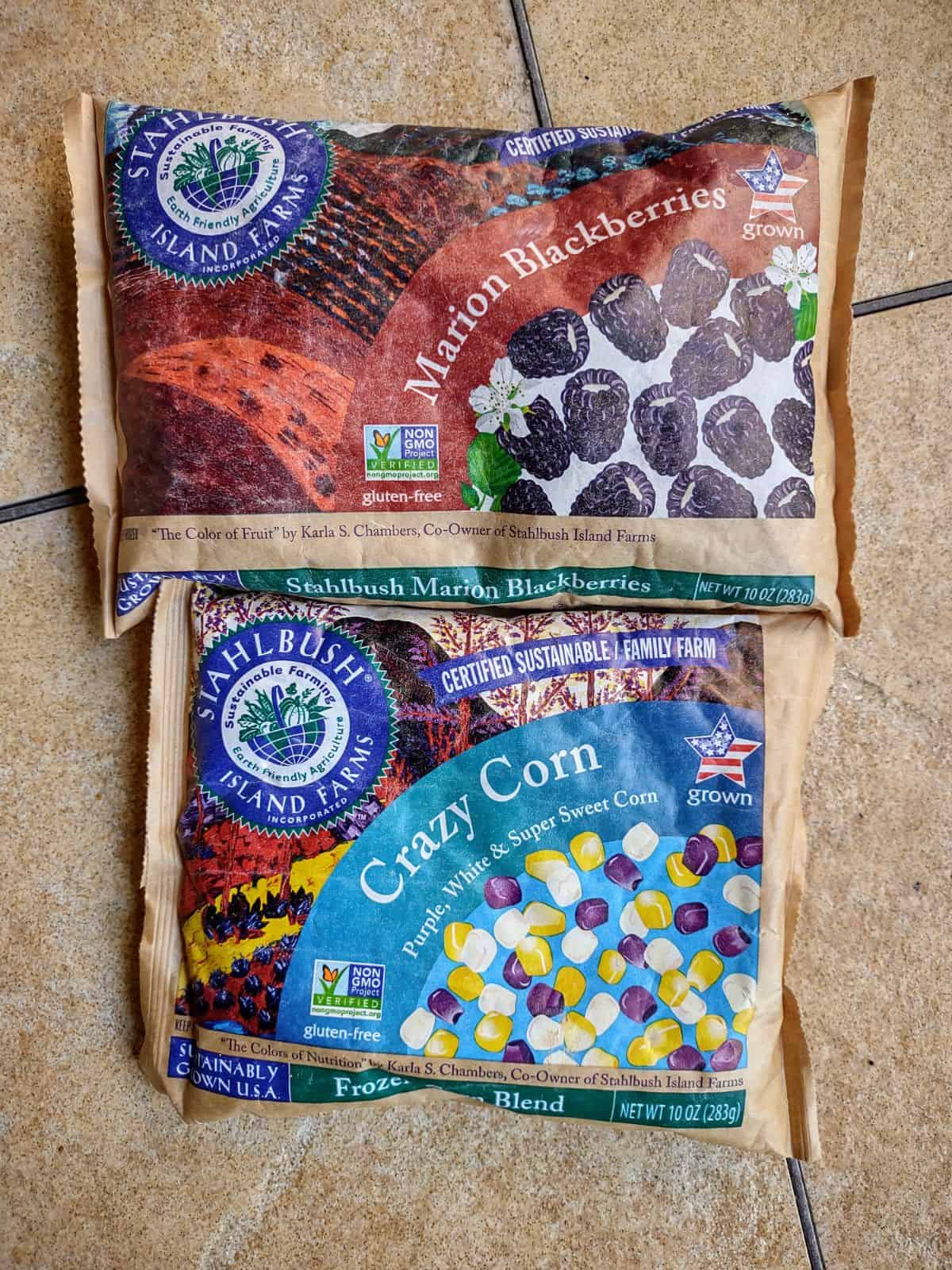
🌽 How They Produce Quality Produce
Eric: So before we go, I would definitely want to talk about the quality of the products you have, the vegetables, the fruits here.
I definitely think there is no better frozen corn on the market than your guys frozen corn. Like it is, it is just superior. Anything else in terms of this, like flavor and quality here. , what's your secrets, you know, but, what things have you guys, besides, I mean, you're taking care of the land.
Well, that's one big portion of it, being able to do that. But it seems like this, like the quality is so good.
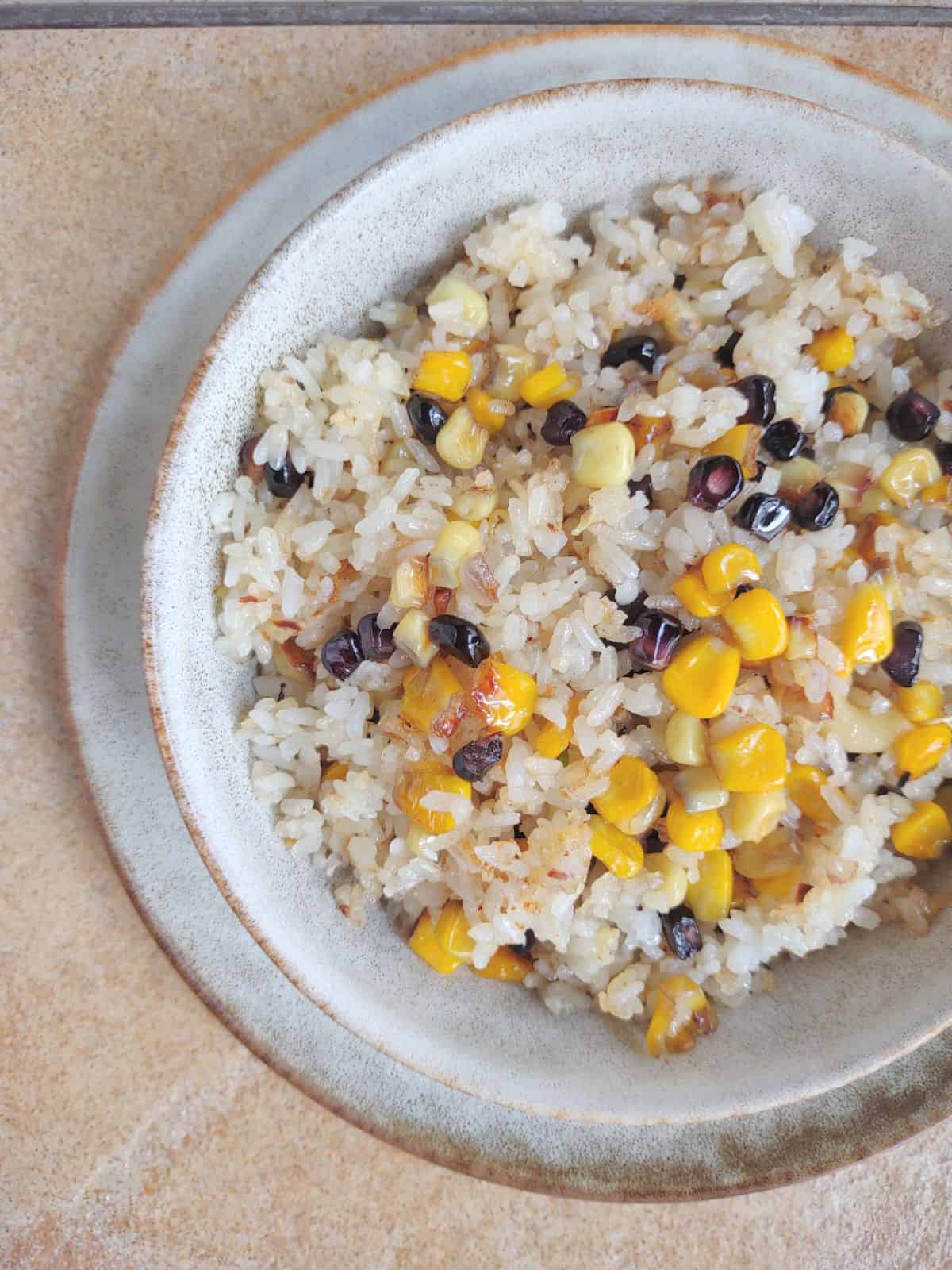
Stahlbush: I'd say just a lot of time and years of understanding which varieties we want to select. Bill and Carla. This is the 38th year. So every year provides different challenges and growing seasons and weather, but so many of our team members are just key on the farm side of growing the best varieties every year and monitoring those crops.
But I think a big piece of it too, is that we're vertically integrated. So not only are we growing a large, portion of these fruits and vegetables, but we're also processing them here as well. So we're able to control when we're harvesting, harvest at that peak ripeness so that we're able to capture all of the color and flavor, um, and natural sugars in our berries so that you bite into your blueberry or your blackberry and you have a really good flavorful fruit to eat.
So we're controlling it, not only on the farm side of when are we planting, how are we monitoring and when are we harvesting, but really getting it into the processing plant as soon as possible. Once it's ready to be harvested, um, individually, quick freezing it and packaging it so that it not only looks beautiful, but taste beautiful.
But having control of that whole supply chain of going out and walking the field ourselves, walking through the processing plant, tasting samples, watching it be processed into bags or, um, cases. And just having control of that whole, uh, process has really been key for our practices here at Stahlbush.
And we have a rule that if you wouldn't want it on your plate, we wouldn't want to sell it. So I think that we've done a good job of sticking to that. Um, really holding ourselves to the highest possible quality. We have, we have a QA lab on site and people are tasting every lot that comes in 24 hours a day.
So, the quality control is just phenomenal here. And I think you can't underestimate the difference that being grown in the USA makes because our stuff is able to be picked so much later and so much, you know, at peak ripeness. And then it's going hours, not days. It's not being housed in a warehouse for, you know, and in transit and being trucked halfway across the world.
We also really focus on the food safety side of things too.
So we hold a certificate, um, that we're audited through safe quality food. And our goal in that every year is, um, to score excellent, the highest in that category. And, um, we're proud to say that we have done that. Um, and that's a customer expectation and making sure that we have the real safest food possible, um, to feed to your families at home.
And I can say I eat Stulbush products almost every day, whether it's a smoothie or sweet potatoes and broccoli for dinner. Um, the convenience factor is huge, but knowing that. Um, you're getting safe. Quality food is great. Um, we serve a lot of populations who have different food allergies. Um, they really want to avoid the big allergens.
So, being a processing plant who only processes fruits and vegetables, we're able to, you know, help those people rest assured that they're only getting the pure fruit or vegetable and that there's nothing added and no concerns for any allergens as well. We get a lot of consumers contacting us asking, you know, do you, can you guarantee that you're not processing this allergen or that allergen?
And we can honestly say, yes, we absolutely know. We don't process any of the top nine allergens because we are out there doing it right there. No, so there's no, we don't have to worry about what lot is coming through after our stuff because it's all our stuff. So that's a really unique, um, aspect of our, um, processing and again, being vertically integrated.
We have people who are medically sensitive. I mean, there's a lady in California who orders sweet potatoes online and she has to do it because her daughter has an autoimmune disorder that escalated and she can only eat like three, three things. In the, you know, at all. And our sweet potatoes is one of them.
So, you know, people like that, it's just, we're a lifeline for them because we can make that guarantee and a lot of people can't because they're in a shared facility.
Eric: That's really special. You see those kinds of stories and you go help out that person. You can only have certain things. You'd be able to do that. It is really, it's really important. And, you know, the way you guys do it, at your scale and, and, and focusing on one thing, cause you see like, you know, a lot of the bigger companies that do everything and do all these things, you know, they can't, promise that they can't because, they may be, you know, have your frozen bag of corn too, but also are they processing wheat there too?
Are they, you know, any of the other, you know, sesame is, um, you know, is there a shellfish somewhere, but you don't know these big things like. There's so much going on.
Stahlbush: Yeah. It's weird when you buy something that's like a one ingredient food and it's like may contain milk, beef, shellfish.

🛒 Where to Find Stahlbush
Eric: Yeah, that is wonderful. All right. Um, so thank you so much for coming on and sharing about your product. So if people are looking to buy some of your wonderful stuff, where are some places they can look?
Stahlbush: Yeah, we're in most major grocery store chains, especially for farmer's market purees and then also, um, Stalbush. So your Fred Meyer, your Safeways, your Whole Foods. Um, places like that. You can also buy it online. So, Stalbush Island Farms, we sell direct at Stahlbushcom, but in bigger quantities, so like quantities of 16 or 24, because it's frozen, so it's shipped.
Today and it's, you know, an, um, a big delivery, but, um, but yeah, our purees, you can get the farmer's market purees on amazon.com. They sell them by the case and then in all major grocery stores just about. And then also the dog food purees, brand, you can get on amazon and on chewy.com.
Eric: All right, listeners, if you haven't tried their products out yet, I would suggest you give them a shot. So, um, thank you guys again for coming on.
Stahlbush: Yeah, thank you for having us. That was fun.
🎙️ More Episodes
I hope you enjoyed this interview. Check out our veggie spotlight series, where me and another food blogger talk about our favorite vegetables.
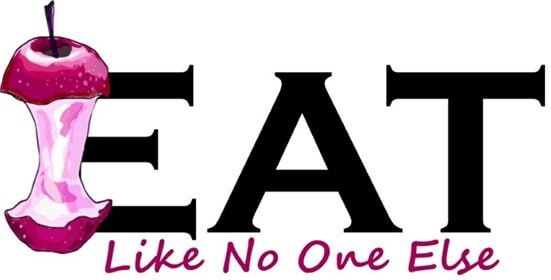

Leave a Reply